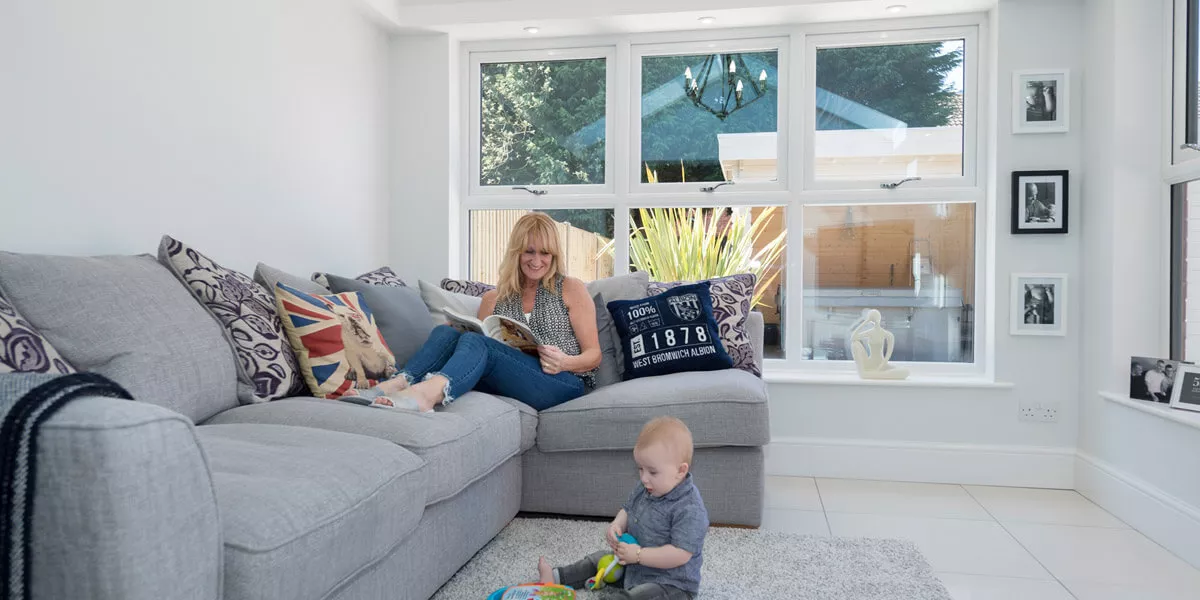At Eden, we pride ourselves on delivering high-quality home improvements, ranging from elegant conservatories to custom-designed home extensions. However, there’s one type of extension we don’t offer: prefab extensions.
While the idea of a quick and cost-effective solution might be tempting, there are several hidden risks that builders often don’t disclose.

Understanding Prefab Extensions
Prefab, or modular, extensions are pre-built in a factory as fully-finished structures and assembled on-site, which sounds convenient. But before you commit to a prefabricated extension, it’s crucial to understand the potential drawbacks and why they might not be the best choice for your home.
How Modular Extensions Work
A modular extension begins with design and planning, followed by off-site construction of the modules in a factory. These modules are then transported to the installation site, where the foundation is prepared. The modules are quickly assembled and connected, with all necessary systems integrated.
Finally, the finishing touches are added to ensure the extension blends seamlessly with the existing home. This process, while efficient and cost-effective, often results in lower build quality and limited customisation options compared to traditional extensions.
The Drawbacks of Prefab House Extension
Modular extensions may seem attractive due to their lower cost and fast installation process. However, they are constructed with lesser-quality materials, resulting in a shorter lifespan and making long-term guarantees improbable.
The customisation options for prefab extensions are limited, restricting homeowners from tailoring the design to their specific needs. Additionally, these extensions are classified as non-standard constructions, which can complicate the mortgage process for potential buyers and hinder future home sales.
Durability Issues
Modular home extensions may initially seem appealing due to their quick installation and lower cost. This factory prefabrication significantly reduces the on-site construction time. While this may sound convenient for homeowners looking for a fast solution, the speed comes at a price.
The materials used in prefabricated extensions are often of a lesser quality compared to traditional extensions, which are meticulously constructed with high-grade resources and heavy steel construction.
This difference in build quality means that modular house extensions are unlikely to last as long, making it improbable for companies to offer long-term guarantees comparable to those provided for traditional builds.
Customisation Limitations
As mentioned, a prefab house extension offers limited customisation options, which can be a significant drawback for homeowners wanting a tailored addition to their home. The factory-built nature of these extensions restricts the ability to adapt the design to meet specific needs and preferences.
Integration Problems
Modular extensions can present significant structural issues when it comes to aligning and connecting them to the existing home through module connection. The prefabricated modules must fit precisely, but even minor discrepancies in measurements can lead to gaps, misalignments, and structural weaknesses. These issues can compromise the integrity of the extension and the original structure, leading to potential problems with stability and weatherproofing.
Properly integrating a modular extension with the existing home often requires additional adjustments and reinforcements, which can negate the time and cost benefits typically associated with prefab construction.
Initial Savings vs. Long-Term Costs
While modular house extensions offer upfront savings due to quicker installation and lower material costs, they often result in higher long-term expenses. These extensions typically use lower-quality materials and construction methods, leading to increased maintenance and repair costs over time.
What initially appears to make sense financially can ultimately become a financial burden as the need for repairs and replacements arises sooner than with traditional, more durable builds.
Unexpected Costs
During modular extension installation, unexpected costs can arise from various factors. Issues such as a complicated site preparation, additional structural adjustments to fit the modules correctly, and unforeseen delivery challenges can increase the project’s budget. These unforeseen expenses can quickly erode any initial cost savings promised by opting for a prefab solution.
Energy Efficiency
Modular house extensions often lag behind in energy efficiency compared to traditional builds. The prefabricated elements and standard materials used may not offer the same level of insulation or energy-saving features found in custom-built extensions with structural insulated panels. This can result in higher heating and cooling costs over time, as the extension may struggle to maintain comfortable indoor temperatures efficiently.
Better Alternatives – Traditional Home Extensions
Traditional home extensions, like those offered by Eden, provide superior quality and longevity compared to modular options. Built with high-grade materials and craftsmanship tailored to your home’s specifications, traditional extensions offer better durability and structural integrity.
They also allow for extensive customisation, ensuring the new space seamlessly integrates with your existing home design. Unlike prefabricated extensions, traditional builds can enhance property value and longevity without compromising on aesthetics or performance.
The only extension you need in your life is a conservatory or orangery from Eden Windows. Read up on both extensions in our Living Spaces brochure.